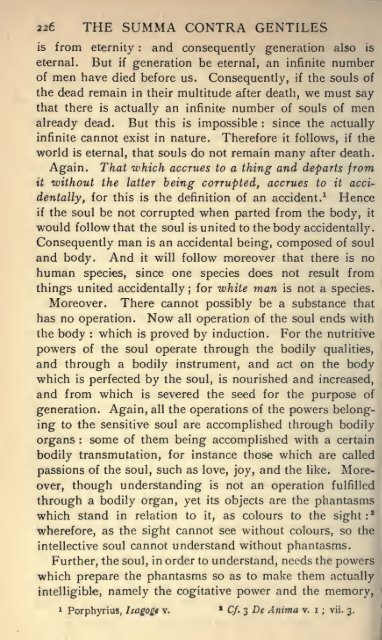summa-contra-gentiles
Summa
Summa
You also want an ePaper? Increase the reach of your titles
YUMPU automatically turns print PDFs into web optimized ePapers that Google loves.
226 THE SUMMA CONTRA GENTILES<br />
is from eternity<br />
: and consequently generation also is<br />
eternal. But if<br />
generation be eternal, an infinite number<br />
of men have died before us. if<br />
Consequently, the souls of<br />
the dead remain in their multitude after death, we must say<br />
that there is actually an infinite number of souls of men<br />
already dead. But this is impossible since the : actually<br />
infinite cannot exist in nature. Therefore it follows, if the<br />
world is eternal, that souls do not remain many after death.<br />
Again. That which accrues to a thing and departs from<br />
it without the latter being corrupted, accrues to it accidentally,<br />
for this is the definition of an accident.^ Hence<br />
if the soul be not corrupted when parted from the body, it<br />
would follow that the soul is united to the body accidentally.<br />
Consequently man is an accidental being, composed of soul<br />
and body. And it will follow moreover that there is no<br />
human species, since one species does not result from<br />
things united accidentally; for white man is not a species.<br />
Moreover. There cannot possibly be a substance that<br />
has no operation. Now all operation<br />
of the soul ends with<br />
the body which ; is proved by induction. For the nutritive<br />
powers of the soul operate through the bodily qualities,<br />
and through a bodily instrument, and act on the body<br />
which is perfected by the soul, is nourished and increased,<br />
and from which is severed the seed for the purpose of<br />
generation.<br />
Again, all the operations of the powers belonging<br />
to the sensitive soul are accomplished through bodily<br />
organs some of them :<br />
being accomplished with a certain<br />
bodily transmutation, for instance those which are called<br />
passions of the soul, such as love, joy, and the like. Moreover,<br />
though understanding is not an operation fulfilled<br />
through a bodily organ, yet its objects are the phantasms<br />
which stand in relation to it, as colours to the sight:'<br />
wherefore, as the sight cannot see without colours, so the<br />
intellective soul cannot understand without phantasms.<br />
Further, the soul, in order to understand, needs the powers<br />
which prepare the phantasms so as to make them actually<br />
namely the cogitative power and the memory,<br />
intelligible,<br />
1<br />
Porphyrias, Isagogt v. • Cf. 3 De Anima v. i ; vii. 3.


















